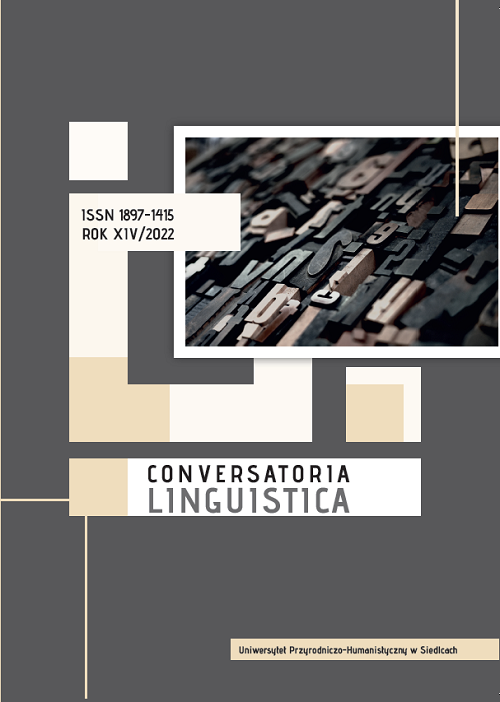Selected Middle English adjectives of happiness: their representation in the Innsbruck Corpus
DOI:
https://doi.org/10.34739/clg.2022.14.01Słowa kluczowe:
adjectives, happy, Middle English, semantic changeAbstrakt
The present paper analyses the fates of the Middle English synonyms of the adjective happy. The group of the examined words contains adjectives beneurous, benewred, felicious, gracious, seely and the key item happy. Focusing on their fates in the period under question, the study uses data from the Innsbruck Corpus of Middle English, a collection of 129 Middle English digitised texts, preserved in 159 files, to determine token frequency, text distribution and semantic changes of the examined adjectives. Other sources used in the study are Middle English Dictionary (MED), The Oxford English Dictionary (OED), Historical Thesaurus of English (HTE) and AntConc, a freeware corpus analysis program. The evidence from the Innsbruck Corpus of Middle English Prose shows considerable discrepancies in the token frequency of the analysed terms and the number of attestations employed in the sense ‘happy’. Although the position of the adjective gracious was extraordinarily strong (354 attestations), the termyielded only 13 attestations used in the sense under study. The marginal status of benewred (2 attestations)and lack of beneurous in the Middle English texts examined announce their loss at the end of the period.
Pobrania
Bibliografia
Special studies
Bately J. (1996): Towards a Middle English Thesaurus: Some terms relating to FORTUNE, FATE and CHANCE, in: Middle English Miscellany: From Vocabulary to Linguistic Variation, ed. J. Fisiak, Poznań, p. 69–82.
Berndt R. (1982): A History of the English Language, Leipzig.
Coleman J. (1996): The treatment of sexual vocabulary in Middle English dictionaries, in: Middle English Miscellany: From Vocabulary to Linguistic Variation, ed. J. Fisiak, Poznań, p. 183–206.
Durkin P. (2014): Borrowed Words: A History of Loanwords in English, Oxford.
Fabiszak M. (2001): The Concept of ‘joy’ in Old and Middle English. A semantic analysis, Piła.
Grygiel M., Kleparski G.A. (2007): Main Trends in Historical Semantics, Rzeszów.
Grząśko A. (2020): To devour one’s love: The concept of TASTE in the world of endearments, “SKASE Journal of Theoretical Linguistics” 17(3), p. 118–129.
Kleparski G.A. (2013): Historical semantics: A sketch on new categories and types of semantic change, in: Historical English Word-Formation and Semantics, eds. J. Fisiak, M. Bator, Frankfurt am Main, p. 59–88.
Kopaczyk J., Sauer H. (2017): Defining and exploring binomials, in: Binomials in the History of English: Fixed and Flexible, eds. J. Kopaczyk, H. Sauer (eds.), Cambridge, p. 1−24.
Łozowski P. (2000): Vagueness in Language: from Truth-Conditional Synonymy to Un-Conditional Polysemy, Lublin.
Łozowski P. (2012): The word as a symbol of experience: from ‘satisfied’ to ‘unhappy’ in sad, in: Words in Contexts: from Linguistic Forms to Literary Functions, eds. P. Łozowski, A. Włodarczyk-Stachurska, Radom.
Molencki R. (2020): Perhaps happiness happens: On the expansion of the Old Norse root hap- in Middle English, in: Mostly Medieval: In Memory of Jacek Fisiak, eds. H. Sauer, P. Chruszczewski, San Diego, p. 335−353.
Molencki R. (in press): From eadig to happy: the lexical replacement in the field of Medieval English adjectives of fortune, in: Contact in English Historical Linguistics, eds. B. Molineaux, A. Honkapohja, B. Loss, Amsterdam–Philadelphia, p. 97−118.
Osuchowska D., Kleparski G.A. (2012): On the scope of English gustasemy with parallel developments in other languages, in: Words in Contexts: from Linguistic Forms to Literary Functions, eds. P. Łozowski, A. Włodarczyk-Stachurska, Radom, p. 126–140.
Sang Ho L. (2014): The Psychology and Economics of Happiness: Love, Life and Positive Living, London.
Sauer H., Schwann B. (2017a), Heaven and earth, good and bad, answered and said: A survey of English binomials and multinomials (Part I), “Studia Linguistica Universitatis Iagellonicae Cracoviensis” 134, p. 83−96.
Sauer H., Schwann B. (2017b): Heaven and earth, good and bad, answered and said: A survey of English binomials and multinomials (Part II), “Studia Linguistica Universitatis Iagellonicae Cracoviensis” 134, p. 185−204.
Sądej-Sobolewska K. (2011): The Synonyms of Hill and Mountain in Medieval English: Explorations in Historical Semantics, “Warsaw Studies in English Historical Linguistics” 5, Warsaw.
Sylwanowicz M. (2007): Old and Middle English Sickness-nouns in Historical Perspective: A Lexico-Semantic Analysis, “Warsaw Studies in English Historical Linguistics” 1, Warsaw.
Whitney B. (1892): Language and the Study of Language, New York.
Żyśko A. (2016): English ‘joyful’ Vocabulary – Semantic Developments, Frankfurt am Main.
Żyśko A., Izdebska M. (2021): Heaven as a locus aomenus – an analysis of the HAPPINESS IS HEAVEN metaphor behind historical meanings of ‘joy’ terms, “Studia Filologiczne UJK” 34(1), p. 421–435.
Żyśko K., Żyśko A. (2015): Motivation for meaning construction: Historical Semantics of English ‘joy’ vocabulary, in: Within Language, Beyond Theories: Studies in Theoreti-cal Linguistics, eds. A. Bondaruk, A. Prażmowska, Newcastle, p. 374–385.
Sources
DOE = Dictionary of Old English, <https://doe.artsci.utoronto.ca/> (date of access: V 2022).
HTE = Historical Thesaurus of English, <https://ht.ac.uk/> (date of access: V 2022).
Markus M. (2008): Innsbruck Corpus of Middle English Prose, Innsbruck: University of Innsbruck (date of access: V–VI 2022).
MED = Middle English Dictionary, <https://quod.lib.umich.edu/med> (date of access: VI 2022).
MWD = Merriam-Webster Dictionary, <https://www.merriam-webster.com/> (date of access: VI 2022).
OED = The Oxford English Dictionary Online, (date of access: VI 2022).




